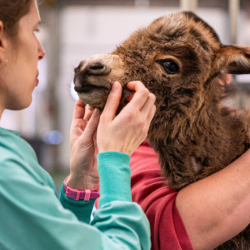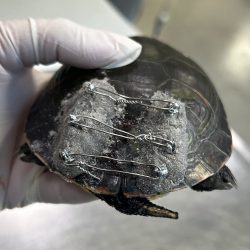It’s that time of year! Foaling season is here and the MSU neonatal intensive care unit is up and running.
We recently received our first neonatal patient, a little paint filly who was born five weeks early. Her owners were quick to realize something was wrong with their anxiously awaited foal, and brought her right in to MSU.
Day 1
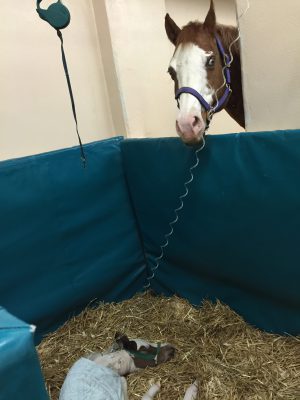
When she came in, the little filly was recumbent and barely responded to stimuli. Her mucous membranes were hyperemic (brick-red in colour), indicating a severe inflammatory response. She was quickly assessed and started on IV fluids. Her mother “Special” was milked, but her colostrum quality was poor, and so the filly was given some of our frozen colostrum through a feeding tube. Colostrum, sometimes called first milk, is vital to newborn foals. It provides them with the immunoglobulins needed to fight off infections they can easily get from the environment. A foal’s gastrointestinal tract is only able to absorb colostrum within the first 12 hours of life, and so it can mean a difference between life and death if a foal does not or cannot nurse during these first precious hours. Since this filly was approaching this 12-hour mark, she also received intravenous plasma to ensure she received the appropriate immunoglobulins.
Once Special’s filly was stabilized, she was placed in one of our specialized 'mare and foal stalls' so we could keep her isolated from the mare while she was on continuous IV fluids, but the mare can still be near and see her foal. She was intensively monitored through the night and given small amounts of milk through her feeding tube.
Day 2
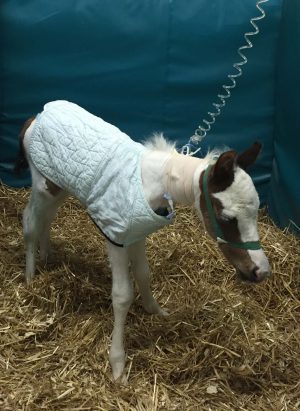
This filly sure is a fighter. She did great overnight, eventually gaining enough strength to get up on her own by morning. Her feedings were slowly increased to ensure her gastrointestinal tract could handle larger amounts of milk, and she just got brighter by the hour.
One of the first things we did when Special and her foal arrived were to take radiographs (x-rays) of her carpi (knees) and tarsi (hocks). The reason for this is that sometimes premature or sick foals can be born with underdeveloped cuboidal bones, or the little bones in their knees and hocks. If a foal with underdeveloped cuboidal bones stands too soon, this can result in bone crushing and eventually severe juvenile arthritis. This is a very painful process and has a very poor prognosis. Thankfully, Special’s foal had fully developed cuboidal bones.
Day 3
Our brave little filly had a bit of a hiccup today. She hadn’t passed any manure in the past 24 hours and abdominal ultrasound revealed a very sluggish gastrointestinal tract. As a result, she was given a warm water enema and her constipation was relieved within three hours. That evening, she was strong enough to be disconnected from her IV fluids, and was allowed to be in the stall with mom. Both mom and baby were very happy!
Day 4
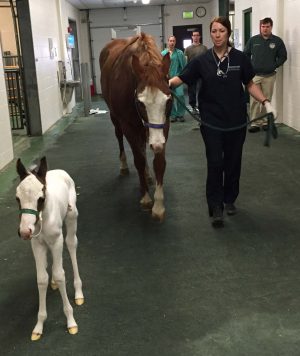
Special and her foal continue to do well! However, even though mare and foal are now sharing a stall, they’ve had a bit of a late start to their relationship. As a result, the foal has not quite figured out how to nurse, so we are still supplementing her with milk through her feeding tube. She is still receiving IV antibiotics as well.
We’ve started taking them for daily hand walks to prevent her tendons from contracting (a danger of having foals confined to a stall), and they both seem to enjoy it!
Day 5
We’ve figured out how to nurse and are loving it! Our rambunctious little filly has discovered the deliciousness of her mom’s milk and is quite pleased with herself. We’ve started to wean her off our supplemental milk feedings as she gets stronger and nurses more and more on her own. She’s also developing quite the personality, having thrown some kicks at her senior student a few times!
Day 6
Special’s foal has been nursing very well over the past 24 hours and, to her delight, her feeding tube was pulled! She responded by running a few laps in her stall and throwing a few happy bucks. If she continues to progress over the next day or so, she will be cleared to go home!
Days 7-8
Over the past 48 hours, Special and her foal have been doing great! The filly's IV catheter was pulled and she was transferred to oral antibiotics in order to complete her treatment at home. Her lovely owners arrived to pick her up and it was a very bittersweet moment for all our staff! She even got her name- Lizzie!
We are always so happy to see our patients go home, but we always miss them! We treat them as our own. We wish the very best to Special, her foal, and to her wonderful owners. This was a great example of how early intervention can be literally life-saving!
Keep an eye out for updates from home on this very “special” filly!

